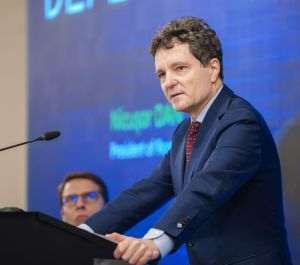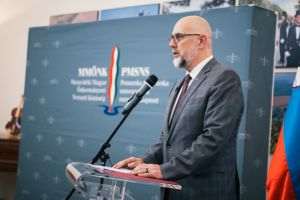The Financial Oversight Authority yesterday surprised stock market investors, by announcing that it will allow the SIFs to buy shares in each other. Some of the market players were very pleased with this decision, but are saying that raising or even eliminating the 5% holding limit would also be needed.
Sources from the stock market told us that the Ministry of Finance is currently working on an opinion concerning the amendment of this threshold.
The elimination of the restriction which prevents one SIFs from holding stock in the others has sparked some controversies on the stock market yesterday.
Some foreign investors think that the SIFs will support each other and will form conglomerates.
They were displeased with the measure announced by the ASF and they have stressed that it will spark a major outrage, "as it is easy to imagine that the five financial investment companies will support each other, given the relationships that connect them".
However, some of the brokers support yesterday's decision by the ASF, and they say that the in the short term, the measure will bring increased liquidity to the market, which has been suffering in that regard lately. In their opinion, the shares of the SIFs will rise significantly in a first stage, due to speculative reasons, "and only then will it become clear how much the SIFs trust each other".
There are voices saying that the goal of this measure is to actually move cash from the SIFs that do to the ones that and leveling the financial performance of the SIFs. These sources are saying that the decision of the ASF presents the risk of a faction gaining control of all the SIFs, especially if the 5% holding limit gets eliminated.
Of course, the "naysayers" on the stock market did not miss the opportunity to say that the trades in SIF shares that happened this week were not coincidental, especially since the stocks of the SIFs weakened.
Doru Lionăchescu, the president of "Capital Partners", considers that the initiative is very good, but he says that the 5% holding limit should be lifted.
He said: "I have been pleading for a long time now for the total deregulation of the SIFs, so that they can be competitive. The first competitor of the SIFs on the stock market is the Proprietatea Fund, which has no restrictions of any kind. Meanwhile, the financial investment companies are facing a number of restrictions - historical legacies that go back 17-20 years. If such an initiative were to become concrete, the result would probably have to be the creation of two SIFs or perhaps even one".
Florin Pogonaru, one of the important investors on the stock market, also speaks in favor of the elimination of the holding limits in the SIFs.
He told us: "The decision of the ASF is a very good one as long as the holding limit is dropped. Otherwise, it's just a good start. There are talks about that happening as well, but it is unknown when they will lead to a result. Now, the Ministry of Public Finance (MFP) should come out with a legislative initiative that would be supported in the Parliament, like it has happened in when the 1% holding limit was dropped. It is illogical to keep the holding limit for the SIFs".
Mihai Mureşian, trading director at SSIF Intercapital Invest, considers that, given the recent evolution of the SIFs, the conclusion can be drawn that yesterday's decision of the ASF was a surprise for the market. "Even if there were expectations that this legislative amendment would happen, it came as the market is in a delicate situation. At any rate, I am sure that the measure will have a positive impact on the evolution of the price of the SIFs in the medium and long term. Even if it will create restlessness in the market in the short term, once the situation settles, I think we will see the prices go to perfect upward trend. At any rate, I think that it is necessary, for the moment, to see what the strategy of the five SIFs will be, and last but not least, what amounts will be allocated for potential acquisitions".
Mihai Mureşian expects the acquisitions in the market to have a high impact on the NAVPS of the companies, given the fact that the interest in the shares of the SIFs is still high.
Trading in the stocks of the five SIFs was suspended yesterday, as the ASF has announced that they will be allowed to buy shares in each other.
According to the decision of the ASF, a collective investment entity AOPC (ed. note: a closed-end financial investment company), including the SIFs, will be allowed to invest in securities issued by another AOPC.
The decision will come into effect at the time of its publication in the electronic bulletin of the ASF, and the Decision that prohibits the SIFs from holding stock in another SIF will be annulled.
Costel Ceocea, the CEO of SIF Moldova, told us that such an amendment would lead to the SIFs being treated fairly and in an indiscriminate manner compared to the other Collective Investment Entities (AOPC) in Romania, would ensure the right environment for allowing the SIFs to increase their performance if they will be allowed to trade major volumes of shares of the other SIFs, allow them to diversify their stock portfolio, increase the liquidity of the shares of the SIFs due to the number of trades conducted with them, and ensuring additional possibilities to hedge their risks in the case of investment decisions.
Dragoş Bîlteanu, the CEO of SIF Banat Crişana, told us, in October last year that the SIFs need an update of the secondary legislation of the CNVM/ASF followed by an update of the stock market legislation, to stop the discrimination of these companies compared to other investment companies and/or closed funds from Romania or Europe.
He said: "It is well-known that in the developed countries, the major financial and industrial groups have stakes in each other, and this only makes them more stable and strengthens them".
The CEO of SAI Muntenia Gabriel Filimon told us in December: "I do not see a problem with the SIFs buying shares in other SIFs. There are a few issuers that have good returns and which are of interest to the Romanian investors. Out of those few, perhaps more than one third are the SIFs. It is unnatural to demand that the SIFs achieve good returns, but to prohibit them to gain exposure to other SIFs, especially since they don't all have the same type of investment strategy. I for one, would find it normal that, if, for instance I, at SIF Muntenia, have one type of investment strategy and another SIF is mostly focused on a different sector, I too can focus on that sector indirectly, through them, like the Proprietatea Fund does".
On the other hand, the president of SIF 3 Mihai Fercală told us, at the end of last year, in an interview: "As for one SIF investing in the others, I don't think that it is a feasible, nor a correct solution; see art. 107 index 1 of the law of companies. Such a decision would not be well seen by the market and would affect the management of the SIFs".
On Monday, BURSA published exclusively the statement of Mircea Ursache, vice-president of the ASF, who, in an impact assessment made by the Authority, said that eliminating the restriction which prohibits SIFs from owning stock in each other would increase the liquidity of the market for an acceptable period of time and investors would benefit from the rise of the price of their stocks.
"The decision of 2005 (ed. note: which prohibited the SIFs from buying shares in each other) is an action which keeps the market in slavery", Mircea Ursache also told us.
He went on to say: "The decision of the CNVM had been made when circumstances were different. In 2005, the portfolios of the SIFs were looking completely different than they do now. At this time, eliminating this measure would not affect the market in any way and it would not lead, under any circumstances, to a concerted action".

























































